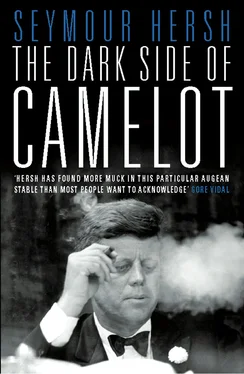1 ...6 7 8 10 11 12 ...34 Jewel Reed, whose husband had also commanded PT boats in the South Pacific, thought that Bobby was put at a disadvantage by his older sibling. “All Bobby wanted to do was to please his brother,” Mrs. Reed said. “I felt Jack was more ruthless than Bobby.”
After the 1960 election, Kennedy put his longtime lover, who came from a wealthy and socially prominent family, into a make-work White House job dealing with international affairs. She watched from the inside and grew extremely skeptical of the men around the president. “He was not surrounded by peers,” she told me. “He was surrounded by intellectual associates, by show business cronies, by family, by old-time family retainers, by a lot of people who were acquaintances but were not friends of his heart.” The woman recalled a private dinner in the White House with the president and one of his very old friends. “And basically what [the friend] wanted was some help in getting a discount on furniture at the Merchandise Mart,” the huge Chicago wholesale furniture hub that was owned by the Kennedy family. “I was amazed. I mean, I was just staggered. It wasn’t about being a friend. It wasn’t about closeness.”
Kennedy’s male friends, she said, like many of his women friends, were attracted by his glamour. “Everyone kept stroking,” she said. “‘You’re fine, it’s great, everything is going well.’ Real friends,” she said, “wade in with you and say, ‘Boy, this is difficult. This is painful.’ I believe he was abandoned at some deep level by the people who thought they were trying to help by keeping things smooth, by saying it’ll all be okay. ‘How can I serve to make your life smoother?’”
Once in the White House, she said, aides such as McGeorge Bundy, the national security adviser, and Robert McNamara, the secretary of defense, “picked up from [Kennedy] not a sense of being Harvard eggheads and smart people, but a sense of being tough. There was part of Jack that rejoiced in knowing what you had to know, doing what had to be done,” she said. “Bundy didn’t know from dirty hands or what Jack knew from street fighting. These men were merely picking up the worst aspects of Jack; they felt they had to be more tough, more Catholic than the Pope.”
All of Kennedy’s aides wanted his acceptance, she said. “In some way I think he must have gotten the least [out] of all the brain power around, because of people’s competition—‘How can we get more of Daddy? How can we get more of his attention? How can we get more of his approval?’ A lot of really radical thinking just went right out the window” on the part of the men who were supposedly giving the president their best advice. Men such as Bundy, McNamara, and Arthur M. Schlesinger, Jr., the Harvard historian who was a special adviser, “could have stretched their minds more if they hadn’t gotten so tangled up in competing for his favor and his time. They wanted to hang out [with Kennedy], as well as to think about public policy. You wanted to be included at dinner, in rides on the boat, in going to movies.”
Gloria Emerson saw the same behavior. The men working for him in the White House, she told me, “loved him too much. They wanted to please more than they wanted to enlighten, and that’s very dangerous, isn’t it? Everyone wanted to see him smile.”
Kennedy, with his glamour and quickness, seemed especially to bring out the insecurity of intellectuals. And no one was more eager to please than Ted Sorensen, Jack Kennedy’s closest aide in the Senate and the White House. Ralph A. Dungan joined the Senate staff as a labor expert in the mid-1950s and was immediately put off by Sorensen, who was his office mate. “He was not the warmest human being that ever walked down the pike,” Dungan told the Kennedy Library in a 1967 oral history. “The one thing that bothered me the most was an incident that was very, very telling. The senator came roaring into that back office, yelling like hell about something, … directing his fire at me. And I didn’t say anything. I hadn’t touched the damned issue. It was Sorensen who had worked on it. He just sat right there and let me take the whole heat without ever saying, ‘It wasn’t him, it was me.’ And I figured at that point whatever happened along the line, if it in any way impaired his relationship with the principal, Sorensen would pitch anybody over.”
Kennedy’s friends lived in terror of his boredom. “We relaxed him.” That’s what Ben Bradlee believed. “We made him laugh. We talked mostly about people and what was going on … [Kennedy] loved gossip about what people are up to and what they’re thinking about.” You had to keep him interested, Bradlee said, but “if he were bored five minutes he’d get up and leave. He wasn’t going to suffer that. I mean, when he was through he was through. He got up and left.” Many others, even those considered to be old friends, had a sense that they, too, were disposable. Charles Bartlett, the journalist, was famed for having introduced Jack to Jackie at a dinner party; Bartlett profited, socially and professionally, from his closeness. But it came at a cost. “He was very spoiled,” Bartlett told me. “One thing you couldn’t do with Jack was bore him. It was one of his least attractive characteristics—how quickly he could turn off.”
Gloria Emerson said that she thought Jack Kennedy became bored “when people talked too much—when they made their case at too great length. He liked movement and results. He had no sort of small talk. He wanted to talk strategy, politics, so one was totally excluded. Things had to have a point for him, and parties were a waste of time unless there was a political advantage to be gained.”
Kennedy’s lover experienced the same sense of impatience and the same anxiety about cutting through it. “It wasn’t just the women going ga-ga,” she said. “It’s everybody trying to be good enough, smart enough, witty enough. I was trying to knock him out—to be terrific. It’s much more criminal in the case of Bundy and McNamara.”
Adding to her anxiety, she said, was Kennedy’s constant “restlessness, a sense that there was something he wanted but it wasn’t quite there. The tapping of the teeth, the tapping of the foot, the drumming of the fingers. A sense that it was hard work. You had to really work to keep his attention unless … he had something that he wanted from you. And then, boy, you were the object of extremely focused attention.”
Her lover’s goal, she said, was to fill his life “with adrenaline. ‘What are we going to do that’s exciting?’ What will he do that will keep his attention from being pulled into darker events or darker feelings? When you want excitement, when you want to be occupied and pulled out of yourself, you’re saying in some way that you don’t have to mull over things that are painful, things that could be very uncomfortable. He was caught in a bind, and the people around him were caught. It was as if he was struggling to come out, but he struggled with people who were in the same dynamic as he was.”
Kennedy ignored any problems in their relationship. When he could not perform sexually, it was simply not discussed, she said. “It was dealing with imperfection by just closing it down. ‘Let’s not think about this anymore.’ But it was clear that he was thinking about it. What do you do? What do you say? I had no idea. Somehow I wasn’t doing it right. I was sexually inexperienced, so I thought it was something I was doing or not doing. I didn’t know what was going on.”
Kennedy understood the extent of his power over men, and he used it. In the late 1950s, Jerry Bruno, who came from Wisconsin, was working in Washington for Senator William Proxmire, the Wisconsin Democrat. Bruno and Kennedy began a conversation in the underground shuttle linking the Senate office buildings to the Capitol. Kennedy invited him to come around his office for a chat. Bruno knew that Kennedy was going to run for president in 1960 and that Wisconsin would be a key primary election state. “I go there and Kennedy stands me up,” Bruno said in a 1995 interview for this book. “I wait one and a half hours and then Evelyn [Lincoln, Kennedy’s secretary] says he wants to see you at his home tomorrow morning at eight o’clock for breakfast. I go there, ring the bell, and the butler comes and puts me in the patio. I sit there and the butler gives me a newspaper.” After a half hour, Kennedy came downstairs, sat at another table on the patio, ate breakfast, and read the newspaper. Caroline, his daughter, climbed on his knee for a moment to get a ride. “He knew I was there, but he didn’t say anything,” Bruno told me. Bruno continued to wait. Asked why he did so, Bruno explained, “Hey, listen, I’m a factory worker who only went to the ninth grade.” He knew his place.
Читать дальше












